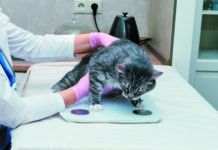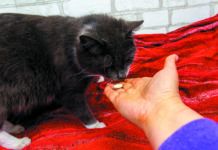

If you have a kitten, you may be quite familiar with his razor-sharp baby teeth, especially when he bites down on your fingers during interactive play. Thankfully, kittens usually lose their baby teeth at three months of age and adult teeth usually replace them.
In some cases, however, baby teeth don’t fall out. The condition is referred to as persistent deciduous teeth, or more commonly and inaccurately, as retained deciduous teeth. “Retained,” by medical definition, refers to teeth that have not erupted normally, such as impacted wisdom teeth. These baby teeth are termed “persistent.” Understandably, this situation leads to a number of problems as two teeth try to occupy the same space.
“It is very unusual for cats to have persistent deciduous teeth,” says Jean Joo, DVM, a veterinarian at Tufts Veterinary Emergency Treatment and Specialties (VETS) in Walpole, MA. “There may be a few days when they have both permanent and deciduous canines present at the same time, but the deciduous teeth are usually lost. However, this condition occurs more frequently in dogs. If you suspect your cat or dog may have one or more persistent baby teeth, please have your veterinarian monitor and treat them sooner rather than later.”
If a cat is diagnosed with a persistent baby tooth, his or her primary veterinarian can usually extract it. If he or she is not comfortable performing the procedure, a pet owner should seek the services of a veterinary dentist.
Baby teeth: more delicate
“The important thing with dental extraction is to make sure the entire tooth is removed and that no roots are left behind,” explains Dr. Joo. “Baby teeth tend to be thinner and more delicate than permanent teeth and are more easily fractured.”
The extraction procedure can vary depending on how much of the tooth roots are still present. A dental X-ray should be taken to assess the tooth or teeth. Surgical extraction involves cutting and pushing back the gums to expose the bone over the tooth roots, and a small amount of bone is carefully removed to expose the roots. If the tooth has multiple tooth roots (teeth can have one, two or three roots depending on the type of tooth), the tooth is cut. Each root is carefully removed and the bone is sanded smooth with a dental burr.
The gum tissue is then placed back in its normal position and the area is sutured closed. Most veterinarians use absorbable stitches, so it’s not necessary that the stitches be removed from the mouth at a post-operative visit.
Prior to surgery, a veterinarian will pre-medicate a cat with an analgesic (pain medication) and a sedative. The medications will allow a veterinarian to insert an intravenous catheter without causing undue stress in the patient. Before extracting the tooth, a veterinarian administers a nerve block and the surgery is completed with a final dose of pain medication.
The cat is sent home with a non-steroidal anti-inflammatory pain medication that should be administered as your veterinarian instructs. Once home, a cat should be allowed to quietly rest and recuperate for a few days and eat soft food such as canned or moistened dry kibble.
Surgical costs to remove persistent deciduous teeth can vary substantially. Veterinary dental specialists tend to be more expensive than primary care veterinarians, so it’s important to consult with a veterinarian before proceeding with surgery.
Early diagnosis is best
As with all dental disease, early diagnosis and treatment can often prevent medical complications. “There isn’t anything a cat owner can do to prevent persistent deciduous teeth,” says Dr. Joo. “However, identifying and treating the problem early can help avoid any discomfort or pain associated with malocclusions.” — Catnip staff





Hi,
Interesting article. Would it be more effective for say a feral or stray cat to retain these deciduous teeth for added predatory skill and efficiency? Do they give them a better grip when seizing and killing their prey?
Also, are these teeth for kittens to grip while nursing?
Do they give them a better grip when kitten playing/rough housing?
Thank you.
Rockabillie